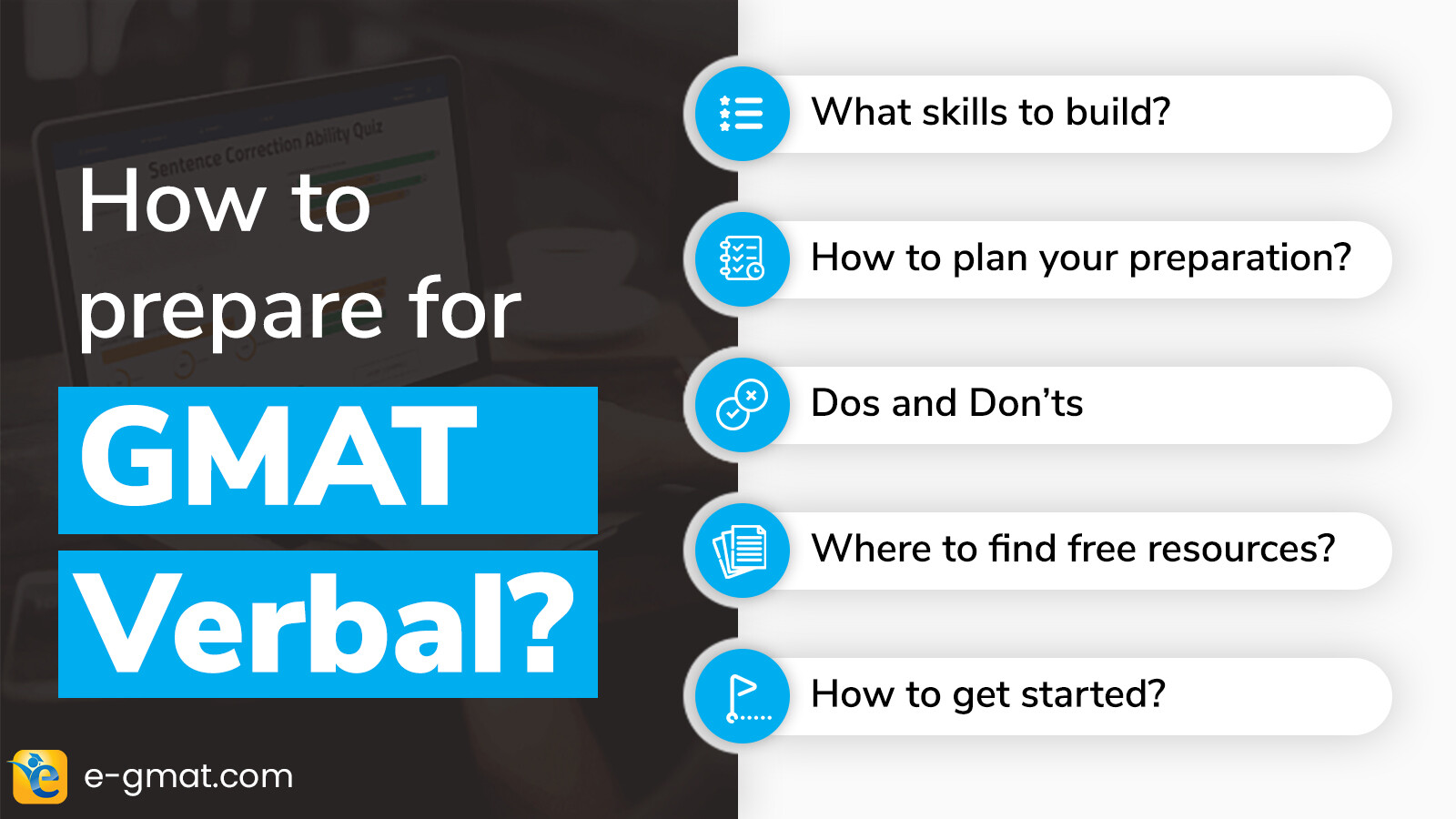How to Improve GMAT Score
If you’re at a conundrum on “How to improve your GMAT Score”, you’ve reached the right place. Preparing for the GMAT is anyway a tiring process, but if you’ve already taken the GMAT and are looking for further GMAT score improvement, that can be daunting! Worry not, we’re here to help!
All GMAT aspirants derive inspiration from the success of their predecessors. But, at the same time, they’re equally wary of the shattered dreams of those who’ve been doing GMAT preparation for months, even years, but have made no headway whatsoever. If success at the GMAT were a direct translation of hours spent solving questions or reading study material, everyone would crack the GMAT exam with ease. And so, we can’t help but ruminate over that adage: what is it that these winners do differently? Is there a secret sauce? That’s where experience comes in handy. In this article, we reveal that secret recipe to success on the GMAT. We list out the best practices to improve GMAT Score that elude most aspirants repeatedly. So, without further ado, let’s begin!
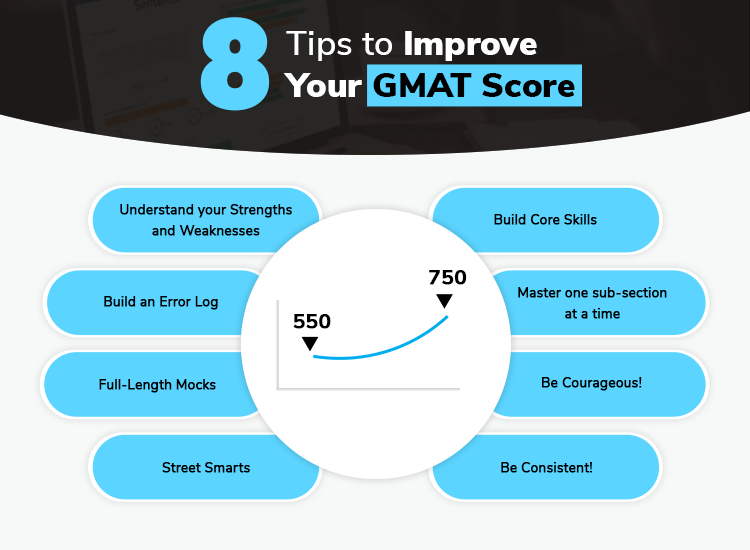
Begin your GMAT preparation with the only prep company that has delivered more 700+ scores than any other GMAT club partner. Achieve GMAT 740+ with our AI driven tools that you personilzed feedback at every step of your GMAT journey. Take our free trial today!
Read our GMAT Focus Edition Series Articles, an invaluable resource to keep you at the forefront of your GMAT preparation journey.
Outline of the article
- Top 8 Tips to Improve GMAT Score
- 1. Understand your Strengths and Weaknesses | Tip for GMAT Score Improvement #1
- 2. Build Core Skills – Don’t blindly practice questions | Tip for GMAT Score Improvement #2
- 3. Build an Error Log | Tip to Improve your GMAT Score #3
- 4. Master one sub-section at a time | Tip to Improve your GMAT Score #4
- 5. Full-Length Mocks are to measure Test Readiness; Sectional Tests are for Improvement | Tip for GMAT Score Improvement #5
- 6. Be Courageous! You need to push the envelope! | GMAT Tips for Score Improvement #6
- 7. Street Smarts | GMAT Score Improvement Tip #7
- 8. Be Consistent and Improve GMAT Score – Tip #8
- Other GMAT Score Improvement Tips in 2023:
- FAQs – Top 8 Tips to Improve your GMAT Score
Watch this video on how to prepare for the GMAT in 2024
Top 8 Tips to Improve GMAT Score
Here are the most important tips on “How to Improve GMAT Score”:
- Understand your Strengths and Weaknesses
- Build Core Skills – Don’t blindly practice questions
- Build an Error Log consistently
- Master one sub-section at a time
- Use Full-length mocks to measure test readiness; Sectional Tests for Improvement
- Be courageous – You need to push the envelope!
- Identify what’s tested and what’s not and be resourceful
- Be consistent and improve your GMAT Score
Now let’s talk about these in detail.
1. Understand your Strengths and Weaknesses | Tip for GMAT Score Improvement #1

World renowned management consultant, educator, and author Peter Drucker, someone whose writings contributed to the foundation of the modern business corporation, once said,
“Most people think they know what they’re good at. They are usually wrong.”
Such a misconception about the GMAT can cost you a lot of time, effort, money, and peace of mind while preparing for the exam. In order to get to your destination, you need to know exactly where you are right now. And, in the context of test readiness, finding the right answer to this question can be a nightmare. Instead of operating on conjecture, you need precise metrics that depict your current levels of knowledge and skill at a granular level. We cannot overstate how crucial this step is in chalking out a study plan and in identifying and allocating resources for skill enhancement.
So, how do we identify our strengths and weaknesses? Simple, write a Diagnostic Test that gives you all the relevant data you need to plan your GMAT preparation. Writing a test at the start of your prep might seem counterintuitive, but the only way to evaluate how well you can swim is to jump into the pool! And if you’re smirking in retort, ‘what if I don’t know how to swim?’ Well, you do! You’ve been developing your Verbal Reasoning and Quantitative Ability since childhood. So, don’t be afraid. Go for it!
2. Build Core Skills – Don’t blindly practice questions | Tip for GMAT Score Improvement #2
Many aspirants are under the delusion that just solving more and more questions is sufficient to develop the skills to crack the GMAT. Although a few people succeed using this strategy – the geniuses, such a practice can ruin a person’s chances at cracking the GMAT. Solving GMAT questions blindly, without proper analysis, knowledge of concepts, and the right approach, will at best lead to microscopic gains and wouldn’t fully prepare the individual for the GMAT even if that person solved all the available questions out there.

Moreover, official GMAT questions are priceless. The quality of these questions stands as testimony to their value. And once attempted blindly, the question is ruined. So, why waste this limited and invaluable resource? There are only so many medium and hard questions out there. Instead, first, focus on strengthening your concepts and learning the right methodology in the first stage of your preparation. You only need a handful of questions for that.
If you are planning to take the GMAT, we can help you with a personalized study plan and give you access to quality online content to prepare. Write to us at acethegmat@e-gmat.com. We are the most reviewed GMAT prep company on GMAT club with more than 2400 reviews and are the only prep company that has delivered more than 700+ scores than any other GMAT club partner. Why don’t you take a free trial and judge for yourself?
3. Build an Error Log | Tip to Improve your GMAT Score #3
The Error Log is arguably the most underrated and widely ignored tool in GMAT Prep. But those who’ve learned how to maintain one diligently have received valuable insights into their preparation and have managed to make surgical corrections, helping themselves reach their target score much more easily and quickly.

An Error Log, if maintained properly, can give you valuable insights into your behavior while attempting questions. A good error log is one that is filled in immediately after every quiz and that captures not just the technicalities of the question but also your behavior while attempting each question. For instance, insights into whether you read the question stem carefully or assumed what was written in it, whether you applied the right approach – such as the Meaning-based approach or Pre-thinking – or reverted to old habits, whether you rushed through the question or took too long, or whether you lack conceptual clarity or sufficient skill, will precisely illuminate your areas of improvement. Moreover, you will always be in a position to share your error log with subject matter and strategy experts, helping them give you informed advice.
4. Master one sub-section at a time | Tip to Improve your GMAT Score #4
Multitasking is a myth! David Sanbonmatsu, a professor of psychology at the University of Utah, says,
“When people multitask, often they do multiple things badly,”
And New York Times columnist David Brooks agrees,
“A person who is interrupted while performing a task takes 50% more time to complete it and makes 50% more errors.”
We, at e-GMAT, also believe so. This is why we recommend that you focus on one sub-section at a time while preparing for the exam. For instance, if you’re focusing on Algebra, don’t try to also do Geometry on the side. Finish studying Algebra completely and cement your skills before switching to the next sub-section. Going back and forth between two or more sub-sections at a time will only add to delay and inefficient prep in each of those sub-sections. You will unnecessarily tax your mind with more information than it can or needs to handle at a time, and you’ll only create more opportunities for confusion.

Moreover, we’re dealing with not just the acquisition of skills but also excellence at those skills. Don’t forget your aim is to score a 730+, the 96th percentile! This requires excellence, and excellence requires focus. Think back to your childhood, when you tried to learn how to ride a bicycle or how to swim or how to play a musical instrument. Anytime you took up two or more things at once, you probably didn’t end up mastering any. And this is no secret. You spread yourself out too thin. That’s what happened. So, make sure you avoid that during your GMAT prep. We’re not saying multitasking is impossible. We’re saying it’s inefficient and will likely lead to failure.
5. Full-Length Mocks are to measure Test Readiness; Sectional Tests are for Improvement | Tip for GMAT Score Improvement #5
The 6 Official GMAT Mocks, provided by mba.com, are without a doubt a valuable resource for every GMAT aspirant. They are the closest thing to the actual exam and offer aspirants the opportunity to experience the adaptive exam first-hand before locking horns with the actual exam. It is no wonder that students end up writing these mocks indiscriminately and haphazardly, in the hope of getting ready for the exam. But more often than not, these students end up running out of official mocks and then finding themselves spending twice as much on unofficial exams that pale in comparison.
If you’re someone at the start of your preparation, you should not be writing mocks in the first place. As discussed earlier, you only need to write an initial Diagnostic Mock to assess your starting abilities. But, even if you’re someone who has finished cementing both sections, you should still not be writing mocks indiscriminately, and here’s why.
We write practice tests for two reasons: to improve our testing abilities and to assess ‘Test Readiness’. It is practically impossible to accomplish both with just 6 Official Mocks. Why?
A high GMAT score can set you apart from the competition and help you get an admit at your dream business school. Start your GMAT Preparation with the most reviewed online GMAT prep company. Try out our FREE Trial Today!
5.1 Improving our Testing Abilities | GMAT Study Tips
Although you have, by now, managed to cement individual sub-sections (CR, RC, NP, WP, Algebra, etc.) within sections (QA and VR), you are now at a stage in which you need to face a mixed bag of questions within one section (QA or VR) in an adaptive test environment. You need to learn how to switch from one type of question to another or one difficulty to another, and you need to do it under time constraints. You need to work on
a. optimizing your time management,
b. refining your testing strategies, and
c. conquering your nerves
in order to maximize your score in each section independently. And accomplishing these takes just about anyone way more than 6 practice tests. The “average” number of tests required for this is around 30 tests per section! Hence, we propose solving Sectional Tests and not full-length Mocks for this endeavor.
5.2 Assessing Test Readiness
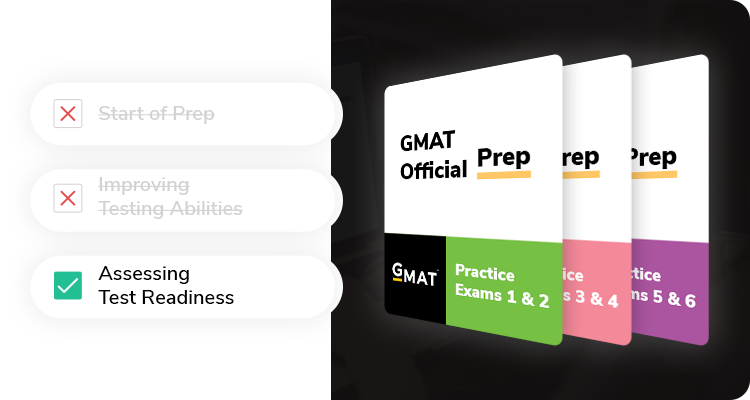
Once you have developed your testing abilities and believe you’ve got what it takes to crack the exam, it’s time to dive into the deep end of the pool and write a full-length exam! The actual GMAT takes 3 hours and 7 minutes to complete, not including the two optional 8-minute breaks. Hence, being ready for the test entails having
a. the stamina and grit to sit and stare at a screen for over 3 hours straight, solving some of the toughest quantitative and verbal questions you’ve seen in your life, and
b. the composure, to not allow your spirit to be shattered into a million pieces at the first glimpse of a question that leaves you stumped.
For those who’ve already solved enough sectional tests to improve their testing abilities, assessing test readiness requires a maximum of 2 to 3 full-length mocks!
So, if you want to optimize the final stage of your preparation, use a mix of sufficient, dependable sectional tests for improving testing abilities and less than a handful of full-length mocks, preferably official mocks, for assessing test readiness.
6. Be Courageous! You need to push the envelope! | GMAT Tips for Score Improvement #6
All aspirants, sooner or later, wonder what if, after taking all measures and precautions, they are still unable to improve beyond a certain point. What if they’re unable to wrap their head around certain complex concepts? What if they’re unable to develop a particular skill? What if they get stuck at medium-difficulty questions? What if they’re unable to improve their reading or problem-solving speed enough to complete the section(s) in time? What if they hit a plateau? What then? What is it that they’re not doing or not doing right?

The solution to this conundrum is philosophical and not technical: you need to have guts! The quintessential quality of a good manager is to have the guts to put everything on the line and improvise, to make the most of your limited resources and still find a way to innovate and get the job done! GMAT prep is no different. You’re never going to get better at a skill unless you have the courage to expose yourself to tougher questions, knowing very well that there’s a good chance you’re going to get it wrong. You’re not going to get faster at solving a problem unless you have the courage to willingly subject yourself to a time crunch.
In the words of Arnold Schwarzenegger,
“Muscles weren’t designed to be bored. They hate monotony.”
Arnold’s famous Shock Principle applies to all muscles. The brain is not technically a muscle; however, you need to exercise it like any other muscle. And therefore, the shock principle works in skill enhancement as well. You need to get out of your comfort zone. For instance, if you expect to solve 31 hard quantitative ability questions in 62 minutes, try solving 65, or 70, or 75. You’re never going to know how fast you can be unless you push yourself. Shock yourself! This is something all successful people do. And don’t be afraid; you’ll be surprised at what you’re capable of. Most of the things we cannot do exist because we haven’t tried them and not because we’re incapable of them. There are candidates, for instance, who finished the entire verbal section with 20 minutes to spare and still scored in the 90th percentile and above! So, what’s stopping you? Don’t give up at the first sight of failure. Push yourself. Success lies beyond that push!
7. Street Smarts | GMAT Score Improvement Tip #7
There’s a popular saying:
“You don’t boil the ocean for a handful of salt!”
Similarly, cracking the GMAT requires a clever mix of not just hard work but also smart work. You do not need to become a grammarian to crack sentence correction questions or a mathematician to crack quantitative questions. You don’t need to be a bibliophile to ace reading comprehension or be Aristotle reborn in order crack critical reasoning questions. Be smart! Sure, there’s no harm in having such aspirations. But you need to put in a lot less effort to crack the GMAT.
7.1 Identify what’s tested and what’s not
In the words of Rajat Sadana, Co-Founder and CMO of e-GMAT,
“The GMAT is just another project. It’s like any other project you undertake at work or in college. You need to commit to it, plan and execute, and be diligent while you’re at it.”
A clever Project Manager is not one who knows everything in the world. It’s one who gets the job done within the stipulated time. This involves a clear understanding of the objective at hand. Only when you know precisely what you want to achieve can you design the most efficient path to achieving it. And those who don’t, end up walking in circles.
7.2 Be Resourceful | GMAT Score Improvement
You need to know what resources to trust. For this, you need to know how to assess resources. The GMAT World, like any other, is full of charlatans, touts, and tyros. And countless fall prey to their gimmicks. They mask the truth and make a fair, objective assessment even more difficult. This puts the onus of being “informed” directly on the shoulders of aspirants.
Resources such as the Official Guides to the GMAT, MBA.com, the GMAT Club, and LinkedIn are avenues where students can get the right information. Reach out to your predecessors. Read genuine reviews, debriefs, and success stories. Learn to differentiate between a personal account and a sales pitch and to analyze numbers and data. Any or all of the above can help you get the right kind of help you need.
For instance, consider the story of Pritam, who improved his GMAT score by a whopping 200 points by using all the right resources from e-GMAT.
If you too are wondering how to improve your GMAT score from 500 to 700, read this inspiring story of Pritam!

7.3 Become a Teacher
Why is it that many aspirants prepare for their exam by becoming teachers? Well, it’s because they’re smart workers. They join Test Prep Companies as Tutors and prepare for their exam on the job.
Relax, we’re not proposing a career switch!
The rationale behind this is rooted in Educational Philosophy. According to The Learning Centre at the University of North Carolina at Chapel Hill, a smart way to prepare is to try to explain the material in your own words, as if you are a teacher. You can do this in a study group, with a study partner, or on your own. Saying the material aloud will point out where you are confused and need more information and will help you retain the information. At first you may need to rely on your notes to explain the material, but eventually you’ll be able to teach it without your notes. When you learn to teach, you go the extra mile to make those logical connections between concepts and learn how to apply interconnected concepts. The saying “Those who can’t do, teach.” does not apply to an Aptitude Trainer. You have to have it, to teach it!
8. Be Consistent and Improve GMAT Score – Tip #8
Last, but by no means the least, you need to be consistent with your prep. To achieve anything in life, we need to be diligent in our efforts. Half-hearted and half-baked attempts seldom lead to success. In fact, they only amount to wastage of resources, such as time, money, and energy, and only add to frustration. We cannot overstate the importance of discipline and routine.
In the words of Anthony (Tony) Robbins, “It’s not what we do once in a while that shapes our lives. It’s what we do consistently.”
The GMAT is an Aptitude Test. It is not a test of theory or concepts. This exam is not cracked through rote learning. It involves skill enhancement, something that can only happen through regularity and discipline. Studying 30 minutes a day, 6 days a week is far better than studying 3 hours on one day and then not studying for the next 6 days. It is true that it is in the gaps between learning activities that our skills mature. But if that gap is too long, we forget what little we learned in the previous learning activity and we stay where we are. There is no progress!
So be a diligent student!
Consistency and diligence are the key, even for those of you wondering: How to improve your GMAT score in 2 weeks? Read this inspiring story of Ashray, who followed the e-GMAT strategies diligently to improve his GMAT score in the last 15 days! Here is the strategy that Ashray used to improve his score in 2 weeks:
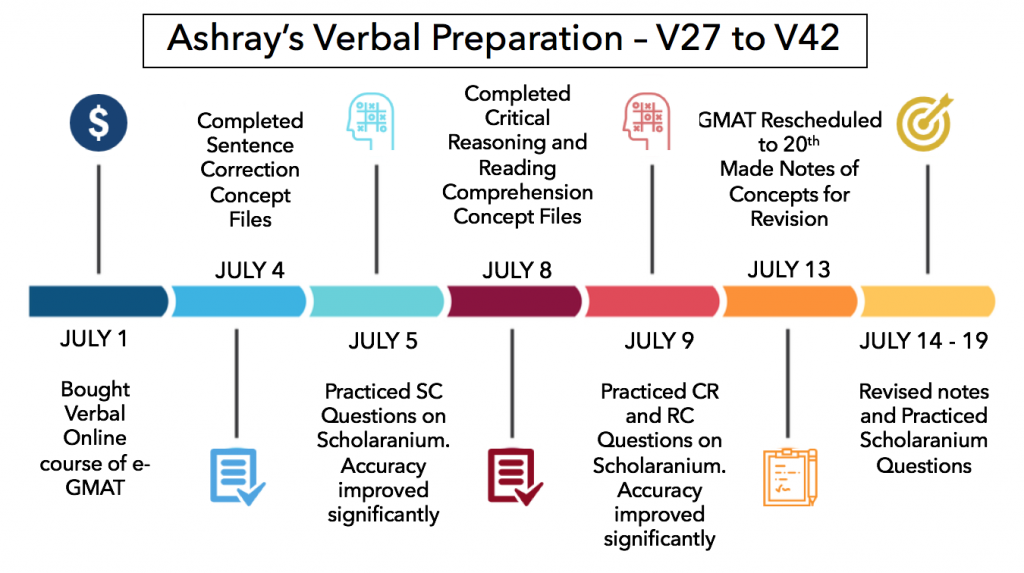
In conclusion, the only obstacle to your success on the GMAT is you! You need to be aware. You need to be professional. And above all, you need to be sincere! We hope this article has lifted the veil over the secret to success on the GMAT. Here are a few free resources to help you get started in the right direction. Until next time!

Happy Learning
Watch this video on how to prepare for the GMAT in 2023:
Top 12 GMAT Score Improvement Tips in 2023:
Here are the top 12 study tips for the GMAT exam:
- Beat Procrastination and focus on GMAT preparation
- Measure your GMAT ability
- Understand how long will it take you to prepare for the GMAT
- Choose a suitable GMAT exam date
- Learn how to tackle anxiety
- Craft a GMAT mock test strategy
- Learn time management
- Prepare a GMAT Strategy for the last 25 days
- Get the best out of your GMAT exam day
- Plan for your GMAT retake, if necessary
- Buy an ESR and analyze it.
- Learn how to a low GMAT score
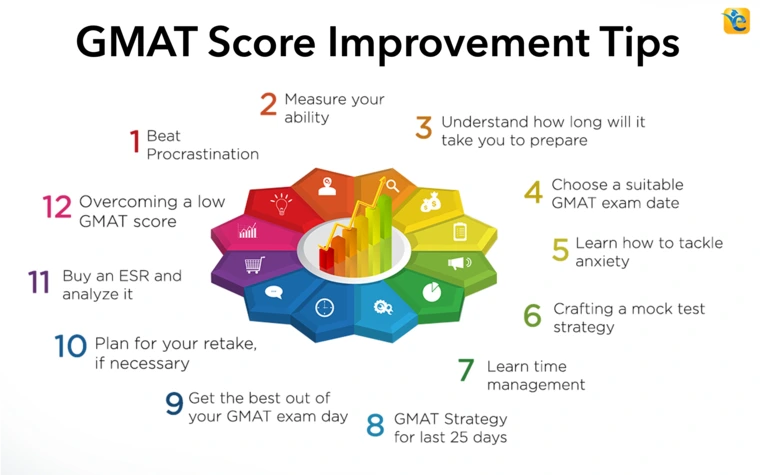
These were the top 12 tips to improve GMAT score:
If you are planning to take the GMAT, we can help you with a personalized study plan and give you access to quality online content to prepare. Write to us at acethegmat@e-gmat.com. We are the most reviewed GMAT prep company on gmatclub with more than 2200 reviews and are the only prep company that has delivered more than 700+ scores than any other GMAT club partner. Why don’t you take a free trial and judge for yourself?
FAQs – Top 8 Tips to Improve your GMAT Score
Yes, there are. Here are the 6 GMAT preparation best practices for 2022:
1. Know all about the GMAT exam
2. Look for the Best GMAT preparation resources
3. Have a personalized study plan
4. Follow sub-section strategies
5. Learn the concepts right and then practice questions
6. Follow Exam day test strategies
Read in detail about these best practices here.
GMAT is a standardized test that is submitted with your MBA application. GMAT score gives an indication of your academic readiness to the business school.
The best way to prepare for the GMAT is to first create a study plan and follow it diligently and with consistency.
Generally, 730 is a good GMAT score. However, a good GMAT score depends on the business school you are planning to apply. A rule of thumb is a good GMAT score is one where you score 20 points more than the average GMAT score of that business school. Learn what is a good GMAT score in this article.
You should take the GMAT in accordance with the application deadline of your target business school. Here is how you should choose your GMAT date.
To overcome a low GMAT you should first analyze your ESR and pin-point your weaknesses. Then create a study plan and follow it diligently. Here is a detailed article on how you can overcome a low GMAT score


